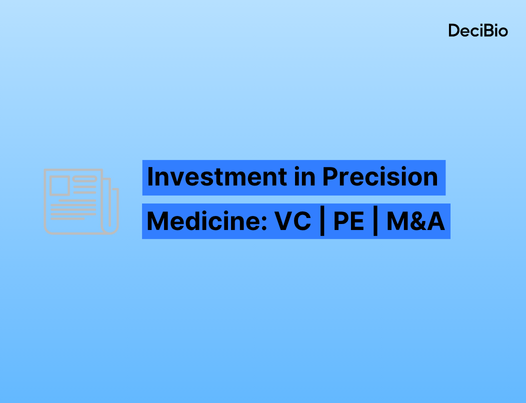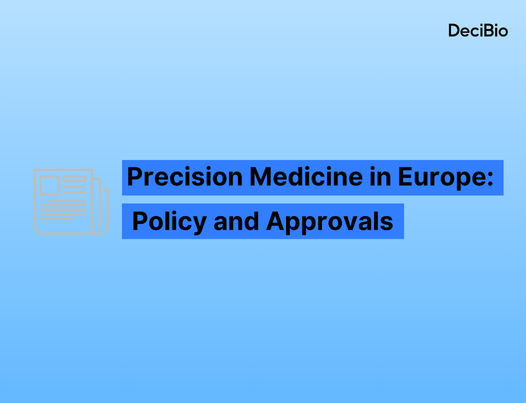Intro
July saw a wave of AI activity across drug discovery, diagnostics, and healthcare operations. New collaborations—from Louisiana’s ALS initiative to Revolution–Iambic’s oncology partnership—underscored AI’s growing integration into early-stage drug R&D, alongside new platforms like Jura Bio’s antibody design system and Elix’s tools for Eisai. Diagnostics saw funding for transplant AI, Microsoft’s multi-agent diagnostic system outperforming physicians in complex cases, and launches including Philips’ ECG AI Marketplace and India’s first AI-powered MRI. In healthcare, U.S. policy moved with the White House’s AI Action Plan, while industry deals like Waystar’s $1.25B Iodine Software acquisition and Charta Health’s $22M raise showed strong commercial momentum. GE HealthCare retained its top spot for FDA AI device authorizations, and companies like Suki expanded leadership to scale operations.
The DeciBio team has updated the landscape analysis of all key techbio players with a clinical pipeline. Check out the updated visualizations here.
Is your team looking to speak with stakeholders, decision makers, or other KOLs? Dexter Experts is a self-service platform that lets you quickly & price effectively schedule 1-on-1 interviews or surveys. Reach out to the team for more info here.
AI in Drug Discovery
1 | New collaborative effort harnesses AI to drive ALS drug discovery in Louisiana | Partnership
2 | Jura Bio’s AI Data Loop Enables Large-Scale De Novo Antibody Design | New Product
3 | AI turns old diabetes drug Halicin into a potent weapon against superbugs | New Research
4 | Revolution lines up Iambic's AI platform in discovery collab worth up to $25M | Partnership
5 | Elix Provides AI Drug Discovery Platform “Elix Discovery™” to Eisai | New Product
AI in Diagnostics
1 | Plexision Secures Investment to Accelerate AI in Transplant Diagnostics | Financing
2 | AI system matches diagnostic accuracy while cutting medical costs | New Research
3 | Philips Launches ECG AI Marketplace to Enhance Early Cardiac Diagnosis | New Product, Commercial
4 | Coronary AI diagnostic developer Heartflow files $100M IPO | Financing
5 | India’s 'first' AI-powered MRI scanner launched in Delhi to enhance diagnostic precision | New Product, Commercial
AI in Healthcare
1 | White House releases AI Action Plan, looks to speed adoption in healthcare | Regulatory
3 | GE HealthCare drives growth with investment in AI-enabled medical devices and tops FDA’s list of AI authorizations for 4th Year with 100 | Regulatory
4 | Suki adds key top executives from Uber, Innovaccer as it looks to scale AI assistant for healthcare | Personnel
5 | Charta Health raises $22M for AI healthcare operations platform | Financing
Summaries
AI in Drug Discovery
1 | New collaborative effort harnesses AI to drive ALS drug discovery in Louisiana | Partnership
Answer ALS has launched the Louisiana AI Drug Development Infrastructure for ALS (LADDIA), a statewide initiative uniting Answer ALS, GATC Health, Tulane University, and Pennington Biomedical to accelerate AI-powered drug discovery for ALS. The collaboration will leverage one of the world’s largest open-access ALS multi-omics datasets and GATC’s predictive AI platform to identify novel therapeutic targets.
2 | Jura Bio’s AI Data Loop Enables Large-Scale De Novo Antibody Design | New Product
Jura Bio has unveiled VISTA, an AI‑controlled data‑loop system that enables large‑scale de novo antibody design from scratch, with a focus on clinically relevant cancer targets. VISTA integrates generative AI, microfluidics and variational gene synthesis to sample, synthesize, test, and iterate tens of billions of antibody‑target interactions in human cell assays, accelerating discovery of high‑affinity, human‑like scFv candidates.
3 | AI turns old diabetes drug Halicin into a potent weapon against superbugs | New Research
Researchers at MIT have developed an AI algorithm aimed at repurposing drugs for novel indications & use cases, with notable success: a recent study has found that Halicin, originally developed as a diabetes drug and selected for its antibacterial properties by the researchers’ algorithm, effectively inhibited 17 of 18 multidrug‑resistant bacterial isolates tested.
4 | Revolution lines up Iambic's AI platform in discovery collab worth up to $25M | Partnership
Researchers at Revolution Medicines and Iambic Therapeutics have entered a multi‑year collaboration in which Iambic will train custom versions of its NeuralPLexer protein–ligand prediction model on Revolution’s proprietary molecular data, with additional access granted to Iambic’s PropANE model for optimizing lead properties. Under the agreement, Iambic stands to receive up to $25 million through upfront payments, performance‑based milestones, and R&D reimbursements. Both companies retain rights to a limited number of exclusive drug targets, enabling parallel discovery efforts across challenging oncology targets such as RAS-addicted cancers.
5 | Elix Provides AI Drug Discovery Platform “Elix Discovery™” to Eisai | New Product
Researchers at Tokyo‑based Elix, Inc. have deployed their generative-and-predictive AI drug discovery platform, Elix Discovery™, within Eisai Co., Ltd., granting the Japanese pharma access to interactive molecular design tools via intuitive GUI for both ligand‑based and structure‑based workflows. Eisai expects this collaboration to accelerate its small‑molecule drug‑discovery efforts by combining Elix’s chemist‑friendly AI tools with its own R&D expertise.
AI in Diagnostics
1 | Plexision Secures Investment to Accelerate AI in Transplant Diagnostics | Financing
Researchers at Plexision have secured a $365,000 endowment from the Richard King Mellon Foundation to enhance their AI/ML‑augmented cell‑based blood tests for transplant diagnostics. These assays—already CLIA‑approved and validated in multicenter studies—now integrate machine learning to rank patient‑specific risks for outcomes such as T‑cell‑mediated and antibody‑mediated rejection, stable graft function, and infectious complications (e.g., EBV lymphoma) in 6–24 hours.
2 | AI system matches diagnostic accuracy while cutting medical costs | New Research
In a new study, a multi‑agent AI system developed by Microsoft, called the AI Diagnostic Orchestrator (MAI‑DxO), achieved 85.5% accuracy in diagnosing 304 complex medical case studies—four times higher than the ~20% accuracy achieved by a panel of experienced general‑practice physicians from the U.S. and U.K. The system also reduced average diagnostic costs by approximately 20%, as it strategically requested fewer and more targeted tests compared to human clinicians.
3 | Philips Launches ECG AI Marketplace to Enhance Early Cardiac Diagnosis | New Product, Commercial
Researchers at Royal Philips have launched the Philips ECG AI Marketplace, a centralized platform that allows U.S. hospitals and cardiac care teams to access multiple vendor AI‑powered ECG tools within existing Philips infrastructure. The first certified third‑party solution available is Anumana’s FDA‑cleared ECG‑AI™ LEF algorithm, designed to detect reduced ejection fraction—a key early indicator of heart failure—directly from a standard 12‑lead resting ECG, to speed up clinician review and support care delivery.
4 | Coronary AI diagnostic developer Heartflow files $100M IPO | Financing
HeartFlow, a developer of AI-powered coronary imaging diagnostics, has filed for a $100 million IPO. With over 400,000 patients served to date, the company’s platform uses AI and computational fluid dynamics to generate 3D models from coronary CT scans, enabling non-invasive assessment of blood flow and plaque characteristics.
5 | India’s 'first' AI-powered MRI scanner launched in Delhi to enhance diagnostic precision | New Product, Commercial
Researchers at Mahajan Imaging & Labs have launched India’s first Ultra‑Fast AI‑Powered MRI scanner, the Excel 3T, at their new integrated diagnostics centre in Dwarka, Delhi. The AI-enabled system delivers up to 50% improved signal‑to‑noise ratio and reduces cardiac MRI scan times to 30–40 minutes, thanks to AI‑driven reconstruction, real‑time motion correction, and contactless respiratory tracking.
AI in Healthcare
1 | White House releases AI Action Plan, looks to speed adoption in healthcare | Regulatory
The White House has released America’s AI Action Plan, outlining over 90 initiatives to accelerate AI adoption across sectors, with healthcare named a top priority. The plan calls for new regulatory frameworks, workforce training programs, and federal agency collaboration—particularly with FDA and NIST—to support the integration of AI in diagnostics, drug discovery, and clinical care. It also encourages the development of AI regulatory sandboxes and aims to streamline adoption by discouraging conflicting state-level regulations.
Waystar has agreed to acquire Iodine Software for approximately $1.25 billion to integrate Iodine’s AI-driven clinical intelligence tools into its healthcare payments platform. Iodine’s proprietary AI models—trained on one of the largest U.S. clinical datasets—enable automation of clinical documentation, utilization management, and denial prevention across over 1,000 health systems. The deal is expected to close by the end of 2025, expand Waystar’s addressable market by more than 15%, and deliver cost synergies of over $15 million.
3 | GE HealthCare drives growth with investment in AI-enabled medical devices and tops FDA’s list of AI authorizations for 4th Year with 100 | Regulatory
GE HealthCare has achieved a milestone by securing 100 FDA authorizations for AI-enabled medical devices, leading the industry for the fourth consecutive year. Their AI innovations span imaging technologies in oncology, cardiology, and neurology, including tools that improve CT, PET/CT, and MRI scan quality and speed.
4 | Suki adds key top executives from Uber, Innovaccer as it looks to scale AI assistant for healthcare | Personnel
Suki, an assistive AI company specializing in healthcare, has appointed three new executives to its leadership team: Joe Chang as Chief Technology Officer (CTO), Dr. Kevin Wang as Chief Medical Officer (CMO), and Vikram Khanna as Chief Customer Officer (CCO). These additions aim to support their goal of scaling the company into a significant triple-digit-million revenue business over the next 3-5 years.
5 | Charta Health raises $22M for AI healthcare operations platform | Financing
Charta Health has raised $22 million in Series A funding led by Bain Capital Ventures to scale its AI-powered platform for streamlining healthcare chart review and billing operations. The platform automatically reviews clinical documentation pre-billing, identifies missed codes, and reduces claim denials—enhancing both compliance and revenue cycle efficiency.

.png)






.png)

.png)


